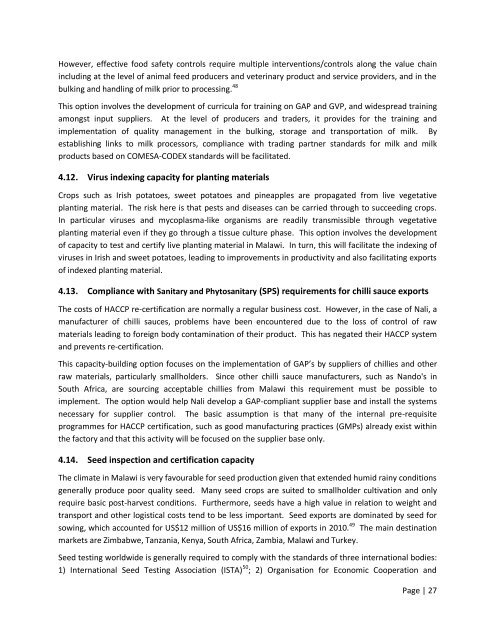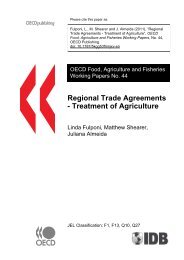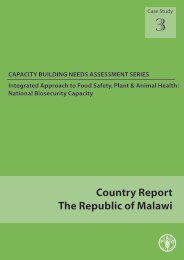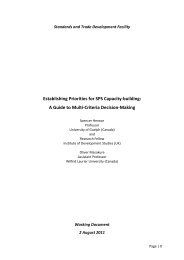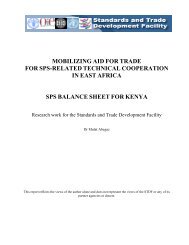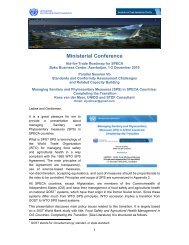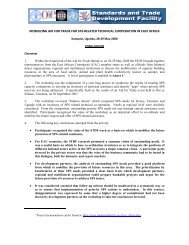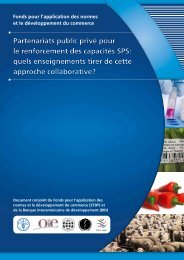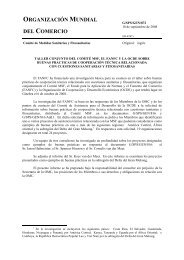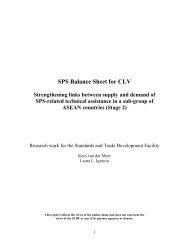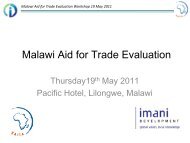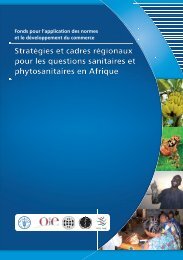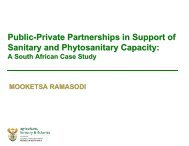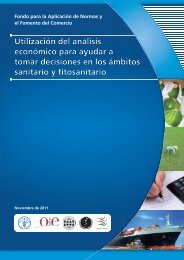MCDA Final Report Malawi - Standards and Trade Development ...
MCDA Final Report Malawi - Standards and Trade Development ...
MCDA Final Report Malawi - Standards and Trade Development ...
You also want an ePaper? Increase the reach of your titles
YUMPU automatically turns print PDFs into web optimized ePapers that Google loves.
However, effective food safety controls require multiple interventions/controls along the value chain<br />
including at the level of animal feed producers <strong>and</strong> veterinary product <strong>and</strong> service providers, <strong>and</strong> in the<br />
bulking <strong>and</strong> h<strong>and</strong>ling of milk prior to processing. 48<br />
This option involves the development of curricula for training on GAP <strong>and</strong> GVP, <strong>and</strong> widespread training<br />
amongst input suppliers. At the level of producers <strong>and</strong> traders, it provides for the training <strong>and</strong><br />
implementation of quality management in the bulking, storage <strong>and</strong> transportation of milk. By<br />
establishing links to milk processors, compliance with trading partner st<strong>and</strong>ards for milk <strong>and</strong> milk<br />
products based on COMESA-CODEX st<strong>and</strong>ards will be facilitated.<br />
4.12. Virus indexing capacity for planting materials<br />
Crops such as Irish potatoes, sweet potatoes <strong>and</strong> pineapples are propagated from live vegetative<br />
planting material. The risk here is that pests <strong>and</strong> diseases can be carried through to succeeding crops.<br />
In particular viruses <strong>and</strong> mycoplasma-like organisms are readily transmissible through vegetative<br />
planting material even if they go through a tissue culture phase. This option involves the development<br />
of capacity to test <strong>and</strong> certify live planting material in <strong>Malawi</strong>. In turn, this will facilitate the indexing of<br />
viruses in Irish <strong>and</strong> sweet potatoes, leading to improvements in productivity <strong>and</strong> also facilitating exports<br />
of indexed planting material.<br />
4.13. Compliance with Sanitary <strong>and</strong> Phytosanitary (SPS) requirements for chilli sauce exports<br />
The costs of HACCP re-certification are normally a regular business cost. However, in the case of Nali, a<br />
manufacturer of chilli sauces, problems have been encountered due to the loss of control of raw<br />
materials leading to foreign body contamination of their product. This has negated their HACCP system<br />
<strong>and</strong> prevents re-certification.<br />
This capacity-building option focuses on the implementation of GAP’s by suppliers of chillies <strong>and</strong> other<br />
raw materials, particularly smallholders. Since other chilli sauce manufacturers, such as N<strong>and</strong>o's in<br />
South Africa, are sourcing acceptable chillies from <strong>Malawi</strong> this requirement must be possible to<br />
implement. The option would help Nali develop a GAP-compliant supplier base <strong>and</strong> install the systems<br />
necessary for supplier control. The basic assumption is that many of the internal pre-requisite<br />
programmes for HACCP certification, such as good manufacturing practices (GMPs) already exist within<br />
the factory <strong>and</strong> that this activity will be focused on the supplier base only.<br />
4.14. Seed inspection <strong>and</strong> certification capacity<br />
The climate in <strong>Malawi</strong> is very favourable for seed production given that extended humid rainy conditions<br />
generally produce poor quality seed. Many seed crops are suited to smallholder cultivation <strong>and</strong> only<br />
require basic post-harvest conditions. Furthermore, seeds have a high value in relation to weight <strong>and</strong><br />
transport <strong>and</strong> other logistical costs tend to be less important. Seed exports are dominated by seed for<br />
sowing, which accounted for US$12 million of US$16 million of exports in 2010. 49 The main destination<br />
markets are Zimbabwe, Tanzania, Kenya, South Africa, Zambia, <strong>Malawi</strong> <strong>and</strong> Turkey.<br />
Seed testing worldwide is generally required to comply with the st<strong>and</strong>ards of three international bodies:<br />
1) International Seed Testing Association (ISTA) 50 ; 2) Organisation for Economic Cooperation <strong>and</strong><br />
Page | 27


